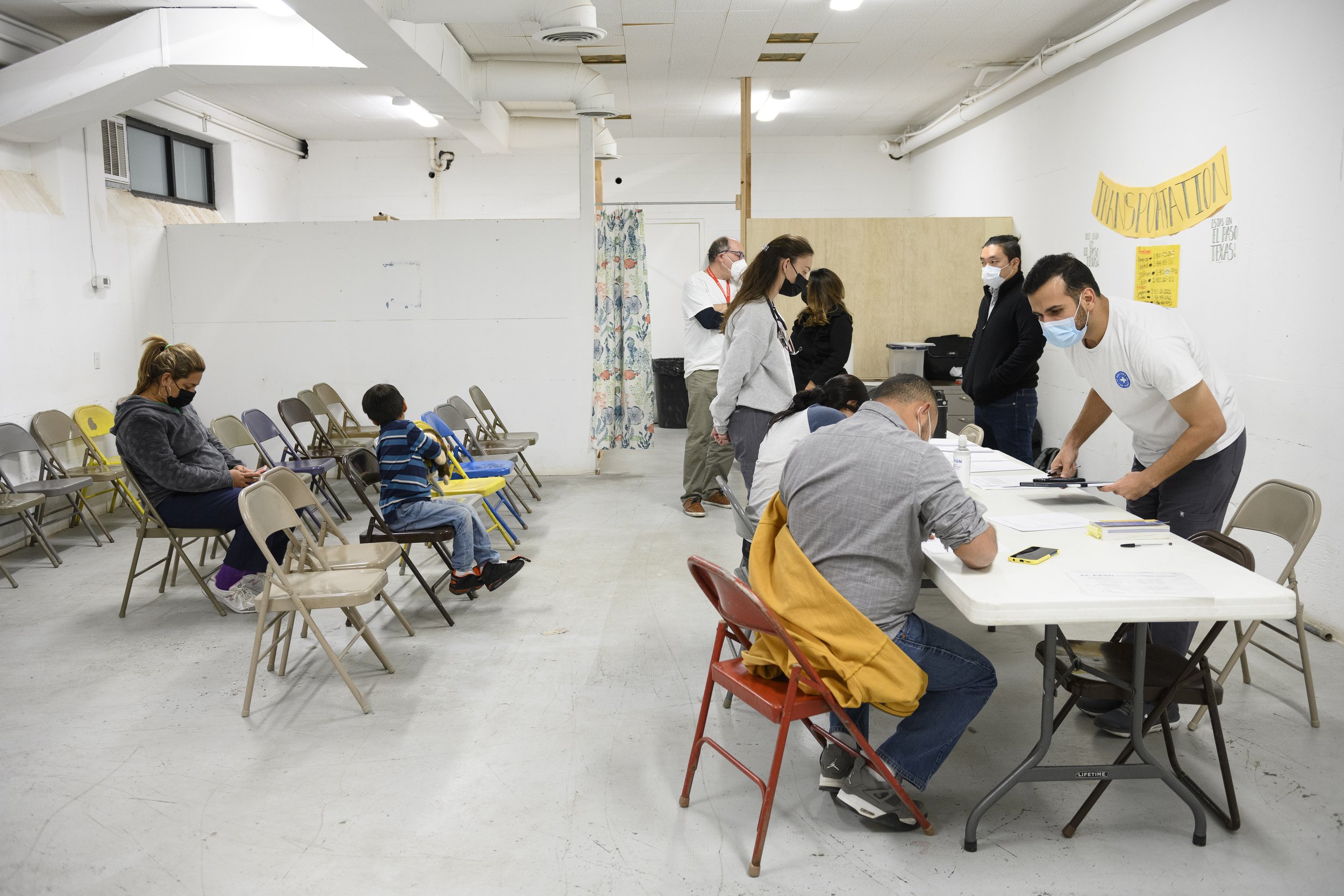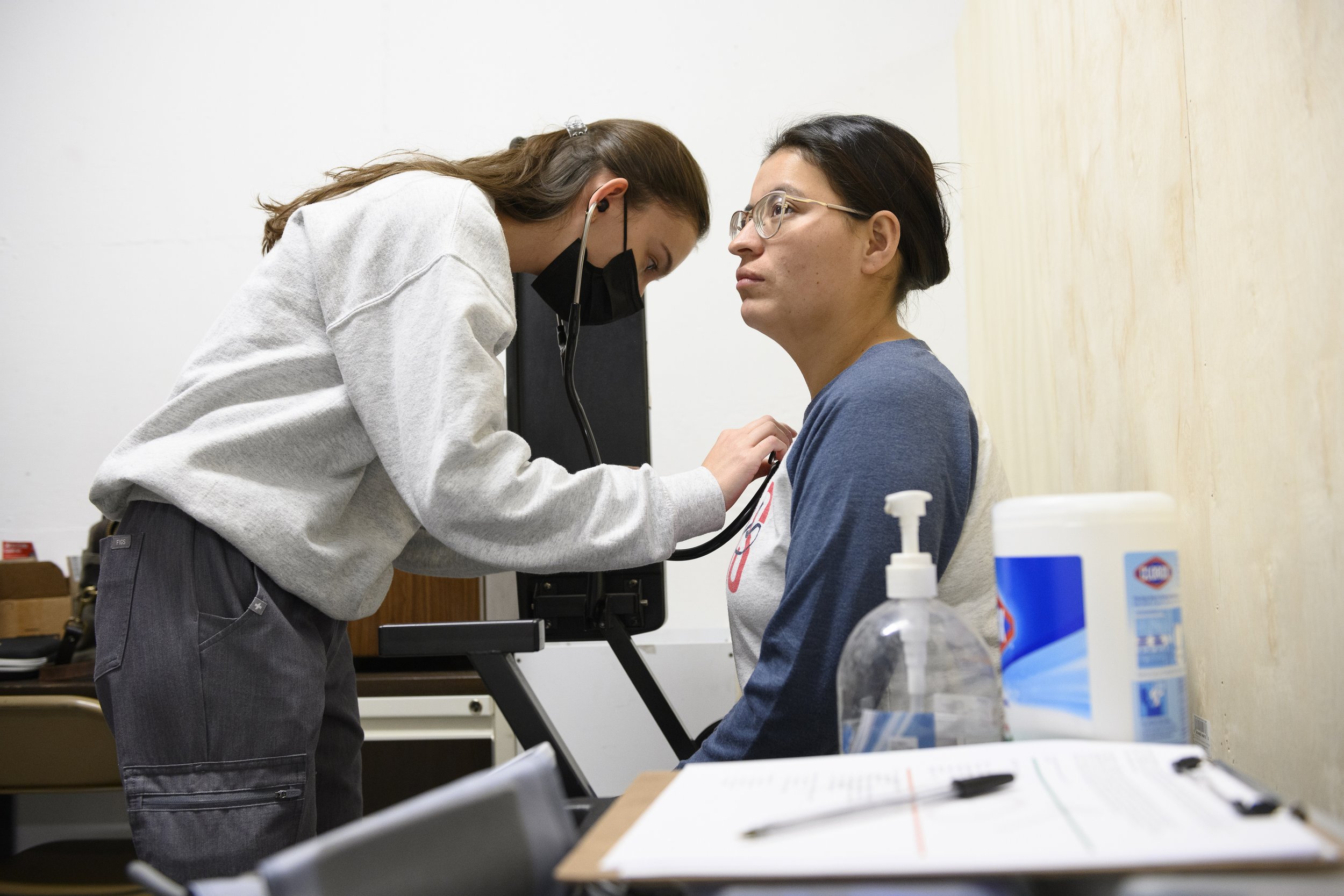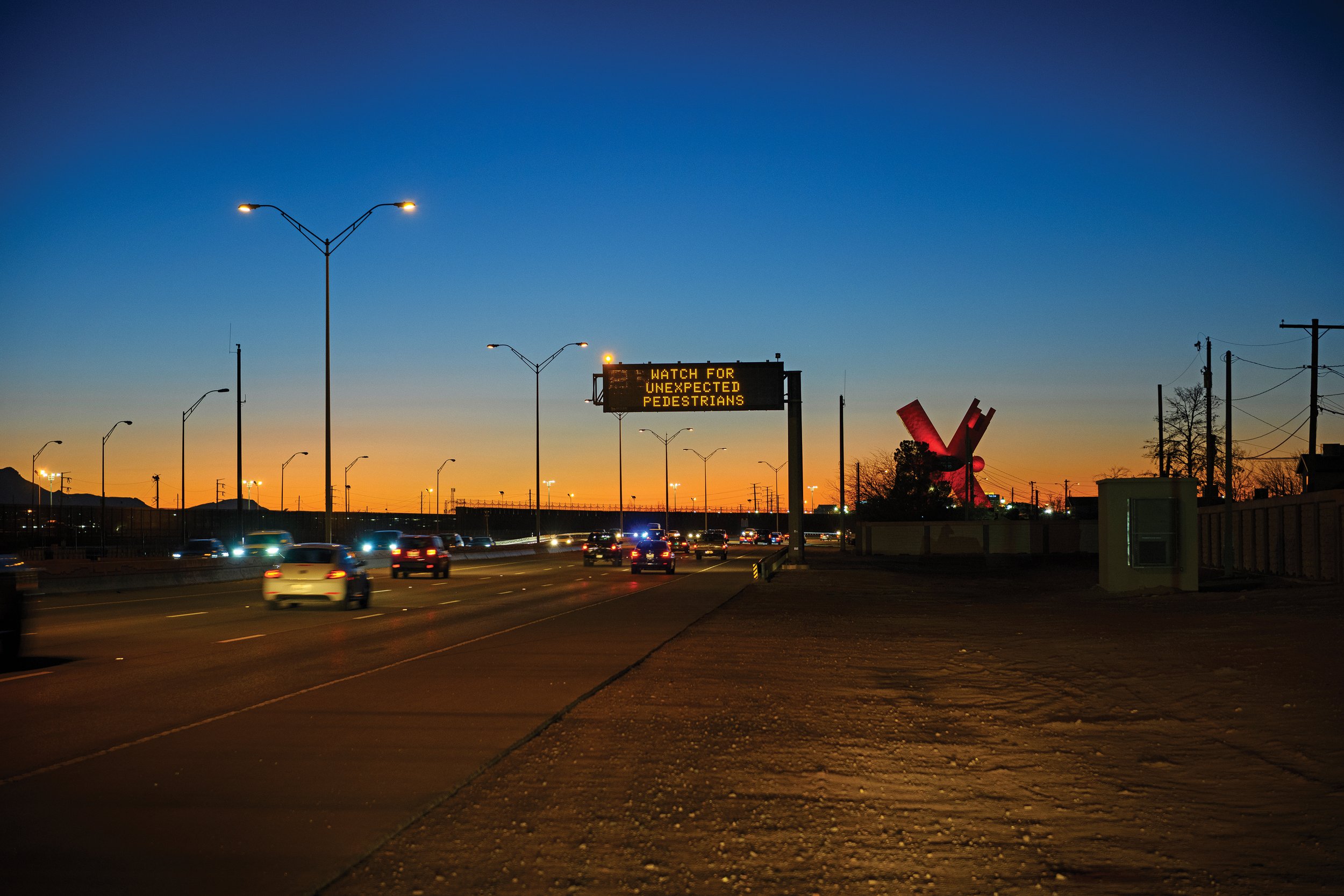
Treating a Humanitarian Crisis
In a no-frills clinic, TTUHSC El Paso faculty teach students while caring for migrants’ medical emergencies
By Aaron Bracamontes
Just days after Christmas, while other children played soccer between rows of cots lined up in a mess hall, one little boy sat in the shelter’s basement playing with a stuffed monkey in a graduation hat. The tongues of his shoes, set free by the missing shoelaces, flapped as his feet dangled from the chair.
Seated in front of an ancient, broken 15-cent-a-Pepsi vending machine, he glanced up at handwritten signs taped to the wall. Next to a list of airline and bus companies’ phone numbers was one sign seemingly intended for him.
“Estas en El Paso, Texas,” the piece of paper told him.
For a migrant, just knowing where you are is vital information after a brutal, disorienting trek through unknown lands. The boy and his family had left Ecuador, traveling to the U.S. via Mexico by bus, hitch-hiking and on foot.
TTUHSC El Paso students help migrants through the triage and intake process while residents and TTP El Paso specialists provide medical care.
On the other side of a privacy barrier made of plywood and shower curtains, a woman, Marilisa, is sitting barefoot. She described the sharp pain in her foot to two Texas Tech University Health Sciences Center El Paso faculty members, who practice medicine at Texas Tech Physicians of El Paso.
The basement has transformed into a makeshift clinic as a part of the collaborative Border Health Program. The program serves the migrant population through a three-way collaboration that includes Doctors of the World USA funding at Annunciation House facilities. The waiting room offers patients metal chairs, and medical students and volunteers pour over paperwork on a folding table. But despite its humble appearance, it’s a clinic where TTUHSC El Paso students, residents and faculty provide quality, compassionate medical care to migrants and asylum seekers.
One of the two physicians that day included Glenn Fennelly, M.D., M.P.H., professor and chair of the Foster School of Medicine’s Department of Pediatrics. He’s also the Doctors of the World USA board president. Aside from physical ailments, the clinic has helped migrants with seasonal illnesses and getting proper prescriptions.
“Many of them have chronic conditions such as diabetes, asthma or high blood pressure. In some cases, their medication was confiscated by Customs and Border Protection,” Dr. Fennelly said. “There may be worsening of these chronic diseases during their journey. Exposure to respiratory viral infections can be a set up for bacterial infections. And there is some level of malnutrition along with not being vaccinated that puts them at risk for severe viral illnesses, such as the flu or COVID-19.”

After getting painful splinters removed from her foot, Marilisa left the basement clinic, ready to sleep on a cot before continuing her journey to Florida. As she exited, she passed the boy without shoelaces and his mother, Maria, who was preparing to meet with a doctor. She, along with her family of six, had spent the last three weeks making the trek from Ecuador. After ignoring her sore throat for so long, Maria was finally able to see a doctor.
“We crossed through the jungle, and it was a difficult journey to endure with four little children. Some days we wouldn’t eat and other days we would just walk,” Maria said while fighting back tears. “It was such a long trip, and I felt a huge relief when the doctors could see me. I’m just grateful we’re here and everyone is healthy. I didn’t know if we would all make it.”
After a stop in El Paso, Maria and her family will continue to New York.
“It was a difficult journey to endure with four little children. Some days we wouldn’t eat ... I didn’t know if we would all make it.”
Maria’s sore throat was a mild infection, or a cold. She’s lucky compared to others. In 2021, CBP recorded 557 Southwest border deaths. Dehydration and other heat-related risks are prevalent in the summer, and the cold can be unforgiving in the winter. With more than 200,000 migrants crossing per month and CBP facilities lacking sufficient medical resources, the Doctors of the World USA Border Health Program partnership with TTUHSC El Paso is critical.
“Doctors of the World and our partners stay after the news cycle ends, past the first wave of the crisis. We want to contribute to long-term solutions for vulnerable populations,” Dr. Fennelly said. “The recent border crisis aside, El Paso’s always expected to have migrants crossing the border or reporting to CBP. We want to be prepared always for a humanitarian response to healthcare needs or medical emergencies that may arise.”
Part of that response is introducing medical students and residents to the clinic as part of their clinical rotations. The experience will prepare them for unique health issues they’ll encounter in the Borderplex region.
On days the clinic is open, four to five Foster School of Medicine students are on hand to help with triage and intake. Second-year medical student Soroush Omidvarnia has helped at the clinic a few times. As a migrant from Iran who came to the United States eight years ago with his family, he knows any help can be a godsend for the patients he sees.
“They’re dealing with all this chaos in so many aspects of their lives. The uncertainty with their health care is something we’re positioned to help with here at the clinic,” Omidvarnia said. “We want to see what gaps they have in their health care and provide any assistance we can with that.”

The clinic also aids with more immediate emergencies such as sexual assault injuries and severe sprains from the journey. However, other injuries require complex surgeries. Some of the most serious are injuries from border wall falls, which have increased more than fivefold since 2019, according to an American Medical Association report.
Texas Tech Physicians of El Paso’s Orthopaedic Surgery and Rehabilitation Department’s trauma team, led by Adam Adler, M.D., FAAOS, has leading experts on high-impact injuries sustained by migrants who fall off the border wall. The damage to bones, joints and surrounding muscles from a 30-foot fall is comparable to high-speed car wrecks, with some key differences.
“In a crash, the vehicle absorbs a lot of the energy from the collision, and the victim receives paramedic care within minutes. When falling off the wall and smashing into the ground, all that impact is absorbed by the body,” Dr. Adler said. “The wounds get complicated by the desert elements, while lying there for hours or even a day. I’ve seen injuries with the bone sticking out and dirt still on it.”
Most of the border wall injuries cause severe swelling, requiring pins and braces to stabilize the injury prior to surgery. Following a definitive surgery, the patients often need follow-up exams and procedures – which in the case of the migrants may never happen, leading to life-long complications sometimes resulting in amputation.
Despite the dire circumstances, Dr. Adler said there is no team in the world better equipped to handle both the severity and quantity of these border injuries.
“You have about 10 of these cases a year in other parts of the country, while we see at least 10 a month. We became experts by necessity, but no one has more experience with these injuries than us,” Dr. Adler said. “There are only so many in the Borderplex capable of handling these surgeries, and they either work at or are associated with TTUHSC El Paso and TTP El Paso. And we’re training the next generation. Our residents are more than capable of treating these complex injuries going forward.”

Of course, not every traumatic event shows physically. For many migrants, and especially children, the entire process of relocating to a different country along with any unsettling events they have witnessed in their home country or on the journey, can leave lasting damage.
For years, TTUHSC El Paso Department of Psychiatry residents and fellows provided psychiatry treatment to migrant adolescents. Many of those young patients have displayed a wide-variety of conditions that need attention, said Cecilia De Vargas, M.D., associate professor and program director for the Child and Adolescent Psychiatry Fellowship Program.
“From the moment they left their countries they have been under constant stress. That includes when they arrive and are detained, processed and placed in a shelter with perhaps hundreds of other families,” Dr. De Vargas said. “Even when they were in their countries, they experienced turmoil. They need help.”
Dr. De Vargas said many youth are diagnosed with anxiety, depression and post-traumatic stress disorder. Some have thought about or attempted to commit suicide.
“And just like any other injury, the longer they go untreated, the worse their problems get,” Dr. De Vargas said.
While some children remain in El Paso for more than a year, others may only be here for weeks. That’s why it’s vital to diagnosis them and provide referrals for treatment at wherever their final destination is.
Foster School of Medicine students Soroush Omidvarnia and Amanda Alfsen go over a list of patients.
There’s no easy way to deal with a humanitarian crisis. But in times of uncertainty, Texas Tech Physicians of El Paso are able to provide treatment and TTUHSC El Paso faculty can provide the education for tomorrow’s health care heroes to continue helping those in need.
Omidvarnia said helping others in precarious situations is part of why he got into medicine. Not every ailment can be cured with medicine, but being there with a smile and some reassurance may be exactly what the body needs.
“Right next to health care, comfort is the most important thing we can give,” he said.

“Just seeing a smiling face, a reassuring voice, lets them know they’ve arrived and are welcome in this clinic. That’s something we want to build on and let them understand we are trying to take care of their health care needs.”
— Glenn Fennelly, M.D., M.P.H., professor and chair of the Foster School of Medicine’s Department of Pediatrics
Your Support Matters
TTUHSC El Paso and Doctors of the World were built on philanthropy — the support of community organizations and people like you. Because of the shared values of community visionaries, TTUHSC El Paso has made the Borderplex region a hub for education, research and patient care in West Texas. The work TTUHSC El Paso and TTP El Paso are doing with Doctors of the World USA expands and enhances the missions of both organizations, and will make an immediate and palpable difference in the lives of the people arriving in our community.
To support either organization, please contact Craig Holden in the TTUHSC El Paso Office of Institutional Advancement at 915-215-5943 or craig.holden@ttuhsc.edu.




